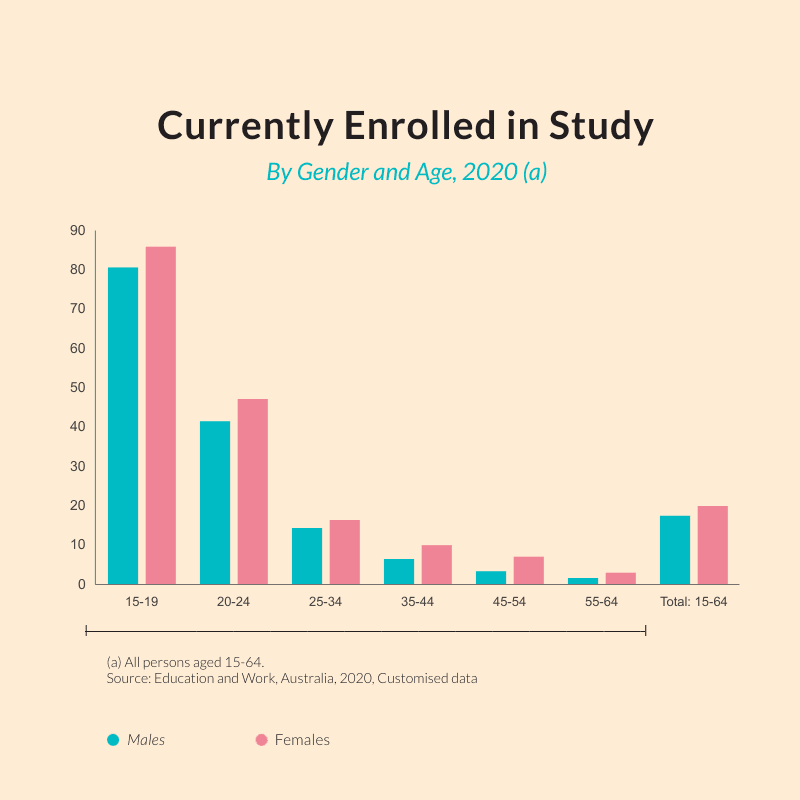Never Too Late: Studying at TAFE as a Mature Age Student

If you’ve been thinking about returning to study later in your 20s, 30s, 40s, or even 50s, enrolling in TAFE as a mature age student is a great option. It can equip you with the skills and qualifications you need to take the next step in your career. Completing a TAFE course is also a great pathway into a university degree,
But returning to study as a mature age student can feel a little overwhelming — especially if it’s been a while since you last studied. Plus, on top of your studies, you’ll probably also need to juggle a multitude of life responsibilities: like full-time work, housework, kids, or caring for someone.
Despite its challenges, going to TAFE as a mature age student is one of the most rewarding decisions you will make for yourself. Today, we’ll cover what you need to know before you start studying, so you can make the most of the experience, overcome the challenges and get on top of your TAFE course.
Meet Vicki: a recently graduated mature age student

Vicki studied aged care at The Gordon, graduating in November 2020. Prior to this, Vicki says the last time she was a full-time student was 15 years ago. Despite a long time away from study, she felt ready to get started, compelled by a desire to start down a new career path.
“I’ve been wanting to work as a personal carer for years so I felt really prepared and motivated to get started,” Vicki says. “My aim was to have several clients while still working part time in marketing communications to keep my hand current in both areas.”
She explains one of the biggest highlights of her experience as a mature age student has been “meeting new people who have tremendous amounts of empathy”.
“I really enjoyed the challenge of studying again and feel it’s good for the soul by challenging yourself and broadening your thinking. Learning is fantastic on so many levels.”
With lived-experience as a mature age student under her belt, Vicki is able to share her advice with you on how to settle back into study after time in the workforce.
Should you attend your orientation?
Most TAFE Campuses will offer an orientation for new students so it’s best to check your TAFE website to find out when the next orientation is available. Orientations can be great in giving you an overall idea of what the campus is like, where your classes will be held and what facilities are available. It also provides a perfect opportunity to meet like-minded people, and connect with other students returning to study at a mature age. Remember, during orientation, everyone is in the same boat, so it’s the ideal time to make friends and start establishing yourself amongst your peers.
At most TAFEs, orientation is also the ideal time to pick up your books and study materials and also meet your teachers. If you’re completing a TAFE course online, you may still be able to attend an on-campus orientation if feasible. This can be a great way to connect with your campus (even if you won’t physically be there) and meet other students as well. Plus, if your course is blended and does require some form of in-class attendance at a later date, it’s best to familiarise yourself with the campus early.
Online study as a mature age student: what’s it like?
Online study is one of the most convenient ways to study later in life. It’s flexible, meaning you can study from home, or even at work on your lunch breaks. And since the COVID-19 pandemic forced all forms of education online, there have been massive improvements in online education delivery.
Vicki’s course was one that ended up being wholly online during the pandemic. “I was set to study on site with The Gordon, but the COVID-19 lockdown meant we transferred to online training,” she explains. “I was amazed at how seamless the transition was, given no one had planned for this.
“The staff made it really enjoyable and were extremely helpful and knowledgeable. They were all very experienced in the area of study so that assisted us greatly with any personal challenges we might have faced.”
As an online student, you’ll have access to all the same levels of support that on-campus TAFE students receive. You also won’t feel isolated or alone. Vicki says the one downside of online study is that it took her “a little longer to build relationships with others in my group”. But it’s entirely possible to make connections with others, as communication channels for online students have improved by leaps and bounds.
Vicki describes the perks of online study are:
“Overall it was a great experience and I’d have no hesitations recommending studying full time online if you can remain focussed and on task.”
Vicki Wilson
Thinking you might want to brush up on your computer skills?
If you’re concerned that your computer skills aren’t up to scratch, enrolling in a refresher course can be a great idea. These skills are essential, especially nowadays, with technology at the forefront of learning materials and the majority of student services and resources stored via a student portal or cloud system.
Try to choose a course (or courses) that relate specifically to your needs. For instance, do you simply need to help with typing, word processing and web research? Or does your course require you to improve your skills in Excel or PowerPoint? Some education providers have support staff available to walk you through the processes and teach you the basics in navigating the systems and programs.
If feasible, consider completing your computer course before your studies begin. That way, you won’t feel too overwhelmed when the semester begins.
Worried you’ll feel out of place?
If you find yourself studying alongside younger school-leavers, and are worried about how to relate and work alongside them; don’t be. Remember, each person is there to learn and develop themselves regardless of age or experience. So, despite what barriers you may feel are in the way, you will always have that goal in common.
It’s also common for students studying at TAFE to be much more of a mixed bunch than students studying at university. At TAFE, you’ll find a wide variety of ages, including those in their 30s, 40s and 50s. You’re also more likely to meet people from a broader range of professional backgrounds — which can be a fantastic networking opportunity.
Give yourself time to get used to the TAFE atmosphere and your classmates. You’ll often find that once semesters kick-off, you’ll get to know your fellow students and discussions and dialogue will be open and respectful.
Start cultivating relationships by introducing yourself to students in your classes and making the effort to talk to them, even if they are much younger or older. Focus on the common ground, and be open to differences — you’ll probably learn something interesting (and may find more in common than you anticipate).

There are challenges to returning to study: Here’s what to expect
Balancing work, life and study
The great juggling act — it’s the most commonly cited challenge of being a mature age student.
There’s no one infallible method for keeping all your balls in the air. Everyone’s life is different, and everyone is likely to be hit with a few curveballs. Vicki says figuring out a method that worked for her has been an “interesting experience”.
“I was studying alongside my two children due to lockdown as well as managing a building project, so I had to be super organised and proactive. Living near the beach kept us motivated to exercise each morning which helped us all mentally prepare for each busy day,” Vicki says.
“Creating lists and making sure I completed assignments as soon as they were released certainly helped me organise my study effectively.
Vicki Wilson
“The Gordon trainers were also very supportive around making sure we met our deadlines, especially knowing we were all juggling much more than we’d expected given many of us were supporting children at home with online schooling.”
Managing your time effectively
Keep in mind that studying doesn’t only mean class or on-campus time. Studying at TAFE also involves lots of reading, researching, writing and preparing for exams/assessments. As Vicki explains, managing your time effectively is key to juggling your responsibilities and studies at the same time.
Vicki’s biggest piece of advice to anyone considering returning to study is: “Write lists; stay motivated by getting out and exercising to break the day; and track your deadlines as it’s important not to fall behind,” she says.
You also need to be practical about how much free time you have, and know when you might need to knuckle down and prioritise your studies.
Dusting off your study skills
So, it’s been a while since you last studied, and you’re feeling a bit rusty.
Many mature age students also struggle with the idea of studying, particularly if it’s been a long time since they’ve had to hit the books.
Luckily, mature age students commonly find they settle back into study pretty quickly. No matter how much time has passed since you last opened a textbook, you’ll probably find it easy to get back into the swing of things.
A lot of mature age students find they actually enjoy TAFE more than high school. You’re studying something you’re interested in, and the focus is on specialising that skillset rather than being forced into a broad variety of subjects. Your interest and passion in your studies is often a great motivator to overcome the anticipated ‘rustiness’ of your study skills. You may even find that your organisation and proactive attitude put you ahead of your younger peers.
There are other avenues of support too, if you’re looking for a hand in getting your study skills up to scratch:
Let’s look at the financial side of things
Once you’re feeling mentally prepared to embark on study as a mature age student, you can rest assured that you’ve overcome one of the biggest roadblocks in returning to study.
But there’s one more roadblock you might be concerned about: are you in a financial position to enrol in a TAFE course? This is a very real and common barrier mature age students experience. Whether you have a family to care for, are a single-income household, or aren’t sure if you can spare the money, you might start to feel that enrolling in a TAFE course is a frivolous investment.
We understand that sometimes, no matter how keen you are to return to study, your financial responsibilities can hold you back. But there are a number of ways you can make study more affordable — so you don’t need to sacrifice your dreams.
Government subsidies and free TAFE places:
Check if you’re eligible for a government subsidised place in TAFE.
The criteria for eligibility are:
There’s also special eligibility criteria for Victorians. These include Victorians who are:
“Victorians who want to reskill, change careers, improve their employment prospects and/or meet the needs of local industries, subject to availability of TAFE places, and prioritised based on need. It is expected that priority will be given to people impacted by the coronavirus, such as women, young people and migrants, and other vulnerable people.”
There’s also an extensive list of free TAFE courses, which includes courses in:
| Free TAFE courses | ||
|---|---|---|
| Accounting and bookkeeping | Community services | Engineering |
| Alcohol and Other Drugs | Commercial cookery | Horticulture |
| Aged care | Dental assisting | Hospitality |
| Agriculture | Disability | Mental health |
| Allied health assistance | Education support | Nursing |
| Building and construction | Early childhood education and care | Youth work |
VET student loans
Even if you’re not eligible for a government subsidised TAFE place, you may still be eligible for a VET student loan. This loan will cover your tuition fees (up to a capped amount).
One of the best things about a VET student loan is that you’ll only have to start paying it back once you start working. Repayments are a minimal amount per year (calculated as a percentage of your salary), and are deducted from your salary before tax, making it very easy to manage. The cherry on top is that these loans are interest-free.
VET student loans are only available for approved higher-level (diploma and above) vocational education and training (VET) courses.
The following providers are approved:
Austudy
Another option to lighten the financial load of study is to apply for Austudy benefits from Centrelink.
There are strict eligibility requirements to receive these payments. You must be:
These payments can be up to $656 per fortnight (if you meet added criteria). The amount you could receive depends on things like your family and living situation, as well as how much income you’re making.
You can still work while receiving Austudy benefits, just be aware that your payments will decrease the more you earn.
Check on Centrelink to find out how much you might be eligible for on Austudy.
Payment plans
Many TAFE institutions offer payment plans so students can pay in instalments rather than trying to pull together a bulk fee at the time of enrolment. This is something that varies between institutions. But if you’re looking for payment information for a specific course and institution, a Tafecourses.com.au course advisor can gather that information for you and walk you through it.
Just navigate to the course you’re interested in on Tafecourses.com.au, and click ‘Get the course guide’. Input your details into the enquiry form, and an expert course advisor will get in touch with you to discuss your options, commitment free.



